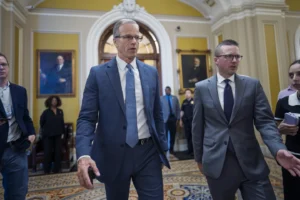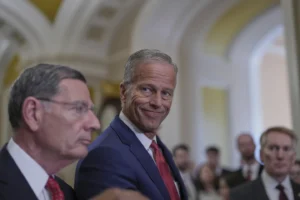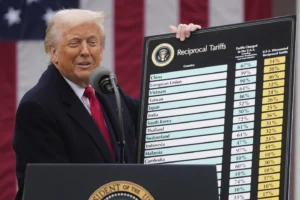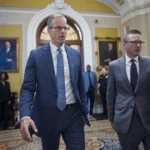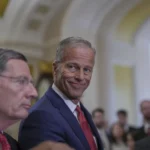Witnesses Testify Trump Attempted to Bend Justice Dept. to His Will, as Congressional Panel Reveals GOP Reps Sought Pardons
In her closing, Cheney spoke directly to Trump supporters: ‘He deceived you’
- Published In: Politics
- Last Updated: Jun 24, 2022

Wyo. Rep. Liz Cheney once again takes a prominent role in the select committee's fifth hearing into the Jan. 6 riots at the Capitol. The next hearing is scheduled to take place in July. (Courtesy photo from the Clerk of the U.S. House of Representatives)
By Jacob Gardenswartz
Special to the Wyoming Truth
WASHINGTON — Even before the beginning of Thursday’s hearing of the House select committee investigating the Jan. 6 insurrection, some in former President Donald Trump’s orbit had cause for concern.
Early Wednesday morning, federal agents conducted a surprise search of the home belonging to former Justice Department lawyer Jeffrey Clark, who served in the Trump administration and whose efforts to support Trump’s unproven claims of election fraud were the subject of Thursday’s presentation.
Trump Justice Department officials, including former acting Attorney General Jeffrey Rosen, testified that the former president threatened to install Clark as the leader of the department unless they publicly backed his election fraud allegations, despite the officials’ repeated attestations to the lack of evidence for such claims.
During one phone call, Trump urged the officials to “just say the election was corrupt and leave the rest to me and the Republican Congressmen,” according to testimony from former deputy Attorney General Richard Donoghue, who shared notes from the time of that conversation.
At least six of those GOP Congressmen, testimony from Thursday’s hearing later revealed, sought pardons from Trump after the violence of Jan. 6. Lawmakers on the committee insinuated those actions demonstrated that the Republican officials understood they had committed crimes. Officials also detailed how online conspiracies worked their way up to the highest echelons of political power in the United States
At one point, Trump’s chief of staff, Mark Meadows, pressed Justice Department officials to look into a claim that voting machines used during the 2020 election were hacked by Italian satellites, an assertion that officials viewed as “pure insanity” and “patently absurd,” Donoghue testified. At the White House’s request, the secretary of defense went so far as to phone a top attache in Rome to look into the conspiracy, lawmakers said.
The saga demonstrated how “insanity went from the internet to the highest levels of government in no time,” said Rep. Adam Kinzinger (R-Ill.), who led much of Thursday’s questioning and who is one of just two Republicans serving on the select committee.
Much of the hearing focused on Trump’s efforts to elevate Clark, an environmental lawyer who led the Justice Department’s environment and natural resources division, to its top post. Despite having no previous experience with election law or criminal investigations, Clark’s support for Trump’s election fraud claims endeared him to Trump and others in his orbit, including a Republican lawmaker who introduced them, according to testimony.
Former Justice Department officials said Trump and Clark insisted they sign onto a draft letter intended to be sent to state officials which claimed the department had “significant concerns” with the election results. Donoghue said signing on to such a document would have amounted to “nothing less than the Justice Department meddling in the election.”
The former Justice Department officials also testified that Trump tried installing a campaign loyalist as a special counsel to investigate voter fraud, asked the Justice Department to file a lawsuit before the U.S. Supreme Court to toss the election and suggested that federal officials seize voting machines. The officials declined, with the former head of the department’s Office of Legal Counsel describing the proposed suit as “meritless” and the machines’ seizure as illegal.
The stand-off between Trump, Clark and Justice Department leadership came to a head when Trump summoned them to the Oval Office in the days before Jan. 6, witnesses testified. Though Trump had planned to name Clark the new acting attorney general —White House call logs had begun referring to Clark as such earlier that afternoon — Justice Department officials said they threatened mass resignations if Trump went forward with that plan, ultimately convincing him to hold off.
“They were willing to sacrifice their careers for the good of our country,” Kinzinger said of the officials.
Though Thursday’s presentation was initially conceived as the penultimate of six public hearings of the select committee, lawmakers announced earlier this week that they will pause further hearings until July because they have received new evidence to investigate. The evidence includes footage of interviews a British filmmaker conducted with Trump and top White House advisors around the time of the insurrection.
The extension of the hearing timeline may also be strategic. Ahead of the upcoming July 4 recess, many lawmakers will head back to their districts for voter outreach leading up to the 2022 midterm elections.
Rep. Liz Cheney (R-Wyo.) has played a leading role as vice chair of the select committee, comprised of seven Democrats and two Republicans, which has made her persona non grata among Republican leadership and many voters in her home state. During Thursday’s hearing it was revealed that her campaign is appealing to Wyoming Democrats, imploring them to switch their party registration and support her in the Aug. 16 primary against her Trump-backed challenger Harriet Hageman.
Cheney used her closing remarks to speak directly to Republicans who still support Trump: “It can be difficult to accept that President Trump abused your trust, that he deceived you,” she said. “That is a fact, I wish it weren’t true, but it is.”

